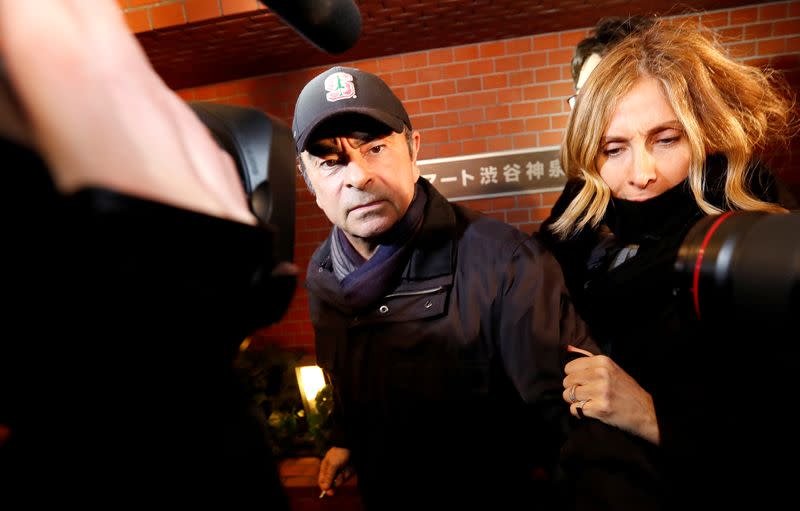Factbox: Financial wrongdoing allegations against Carlos Ghosn

(Reuters) - Carlos Ghosn, the ousted boss of the Renault-Nissan <RENA.PA> <7201.T> carmaking alliance who fled house arrest in Japan last week, denies the allegations of financial misconduct made against him.
Following are the court charges against Ghosn, his responses and counter-claims:
UNDER-REPORTED EARNINGS
After arresting him in November 2018, Tokyo prosecutors the following month charged Ghosn and fellow board member Greg Kelly with conspiring to hide 5.2 billion yen ($48 million) in Ghosn's earnings over five years from 2010 in filings to the Tokyo Stock Exchange. In January last year, when Ghosn was still being held in Tokyo's main jail, prosecutors brought a second charge for allegedly under-reporting a further 4.1 billion yen in the subsequent three years.
Nissan, which has also been charged in connection to the under-reporting, declined to give further details about the allegations, but the Nikkei business daily, citing unidentified sources, said Ghosn had received share price-linked compensation of about 4 billion yen over a five-year period to March 2015 and it went unreported in Nissan's financial reports.
The financial reports also did not mention annual compensation of 100 million to 150 million yen Ghosn received from the automaker's overseas subsidiaries, the newspaper said.
In a statement made during his first court appearance, Ghosn said all earnings had been disclosed and that any deferred compensation due to him after retiring had been approved. In what he referred to as a "death test" he argued that none of his heirs would have received payments apart from his retirement allowance, meaning that it did not count as earnings.
BREACH OF TRUST
A third charge brought by prosecutors in January 2019 was for alleged breach of trust for transferring personal losses of 1.85 billion yen from investments in currency derivatives to Nissan in October 2008 in the midst of the financial crisis.
The charge also alleges Ghosn authorized a total of $14.7 million in payments from a Nissan subsidiary to a company owned by another individual when the investments were transferred back to the asset management company between June 2009 and March 2012.
Ghosn, in a court filing, said he invested in the financial instruments to avoid currency fluctuations because he was paid in yen rather than dollars. After his banks asked for more collateral, he said he asked Nissan to temporarily, and at no cost to the company, take on the currency swaps. His only other choice, he said, would have been to resign from the automaker in order to access his retirement allowance.
MISAPPROPRIATION OF FUNDS
The fourth charge brought by prosecutors in April 2019, alleged Ghosn illegally misappropriated $5 million from Nissan between July 2017 and July 2018.
They accuse the former Nissan chief of approving three payments totalling $15 million to a Nissan dealership, a portion of which was then transferred to a company controlled by Ghosn.
OTHER ALLEGATIONS
In April, former Nissan Chief Executive Hiroto Saikawa said a months-long internal investigation had also uncovered evidence that Ghosn used company funds for personal purposes and misrepresented the company's investments.
Nissan said it had filed a criminal complaint against Ghosn in relation to the matter, saying it had determined that some of its overseas payments had been ordered by Ghosn for his personal enrichment.
Japanese public broadcaster NHK reported Nissan paid billions of yen to buy and renovate homes for Ghosn in Rio de Janeiro, Beirut, Paris and Amsterdam, citing unidentified sources. The properties had no business purpose and were not listed as benefits in filings to the Tokyo bourse, it said.
The Nikkei reported that Nissan - through a British Virgin Islands unit of a Dutch venture fund subsidiary - bought and renovated homes for Ghosn in Brazil and Lebanon worth around $18 million. Nissan, the report added, also paid several hundred thousand dollars for Ghosn's family vacations.
The Yomiuri, Japan's biggest-circulation daily, said Nissan had been paying Ghosn's elder sister $100,000 a year since 2002 for a non-existent advisory role. She lived in a luxury Rio de Janeiro apartment funded by a Nissan subsidiary, according to the report, which cited unidentified sources.
DENIAL
In statements released through his lawyers in Japan and court filings seen by Reuters, Ghosn has denied any wrongdoing, saying that all payments were approved and above board. He asked the courts to dismiss the charges against him before fleeing to Lebanon.
Ghosn says he was ousted as chairman of Nissan as part of a government-backed coup to destroy any possibility of a merger between Nissan and its French alliance partner Renault <RENA.PA>.
Ghosn's legal team also says prosecutors withheld evidence, citing concerns voiced by Nissan that it included sensitive information about operations and employees.
(Reporting Tim Kelly; Editing by Mark Potter)

